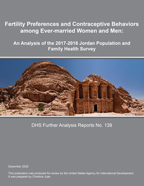There is no printed copy available to order.
Abstract:
Over the last three decades, Jordan has seen a decrease in the average number of children born to women in the country, from 5.6 children according to the 1990 Jordan Population and Family Health Survey (JPFHS) data, to 2.7 children in the 2017-18 survey. This further analysis examines fertility desires, intentions, and modern contraceptive method uptake among ever-married women and men of reproductive age in Jordan, using the 2017-18 JPFHS. This most recent JPFHS is the first to interview men and to examine men’s fertility and contraception-related experiences.
Multivariable logistic regression analyses were carried out to examine the associations of socioeconomic factors, nationality, sex of the head of household, and other covariates with three outcome variables of interest—desire for three or more children, wanting to have children soon (within 2 years), and modern contraceptive use among women and men. Other variables of interest included exposure to family planning messages, number of living children, and governorate. Models that examined the fertility and contraception indicators with sex as a covariate were also analyzed.
The odds of women wanting three or more children are nearly two times higher compared with similar fertility desires of their male counterparts, after accounting for other factors. In contrast, there is a 35% reduction in the odds of women wanting children soon – in the next 2 years – compared to men. This finding aligns with the finding that women have three times greater odds of using a modern contraceptive method than men in the sample. The women and men in the study had strongly held fertility desires to have a larger family, which ideally would be three or more children.
The findings also illustrate disparities in covariates including education, governorate, and the number of living children. However, overall, there was little to no statistical evidence of a difference in wealth and residence with the outcomes. In general, different levels of education are associated with the three outcome variables of interest when examining women and men as subgroups. The analysis also suggests a negative association between wanting children soon and modern contraceptive method use among women in female-headed households. Further research on the gender dynamics, culture, and social norms surrounding fertility preferences, reproductive health, and family planning in Jordan is recommended.
